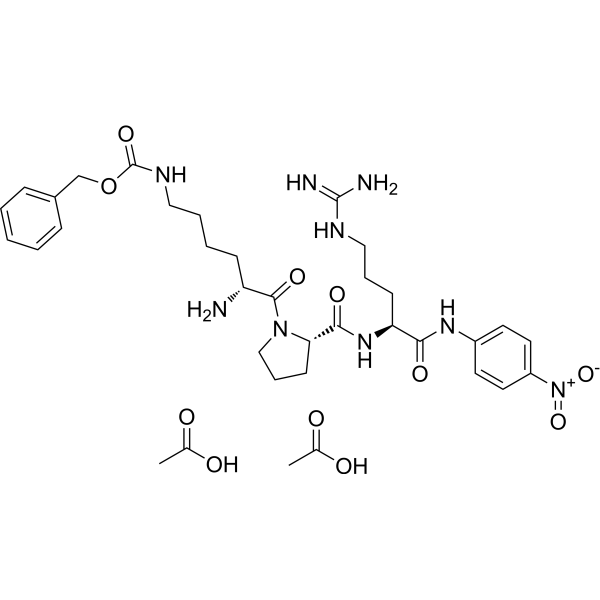
D-Lys(Z)-Pro-Arg-pNA diacetate
CAS No. 108963-70-8
D-Lys(Z)-Pro-Arg-pNA diacetate( Spectrozyme PCa; Chromozym Pca diacetate )
Catalog No. M29736 CAS No. 108963-70-8
D-Lys(Z)-Pro-Arg-pNA (diacetate) diacetate is a chromogenic substrate.
Purity : >98% (HPLC)
 COA
COA
 Datasheet
Datasheet
 HNMR
HNMR
 HPLC
HPLC
 MSDS
MSDS
 Handing Instructions
Handing Instructions
| Size | Price / USD | Stock | Quantity |
| 5MG | 311 | Get Quote |


|
| 10MG | 446 | Get Quote |


|
| 50MG | 1337 | Get Quote |


|
| 100MG | Get Quote | Get Quote |


|
| 200MG | Get Quote | Get Quote |


|
| 500MG | Get Quote | Get Quote |


|
Biological Information
-
Product NameD-Lys(Z)-Pro-Arg-pNA diacetate
-
NoteResearch use only, not for human use.
-
Brief DescriptionD-Lys(Z)-Pro-Arg-pNA (diacetate) diacetate is a chromogenic substrate.
-
DescriptionD-Lys(Z)-Pro-Arg-pNA (diacetate) diacetate is a chromogenic substrate.
-
In Vitro——
-
In Vivo——
-
SynonymsSpectrozyme PCa; Chromozym Pca diacetate
-
PathwayOthers
-
TargetOther Targets
-
Recptor——
-
Research Area——
-
Indication——
Chemical Information
-
CAS Number108963-70-8
-
Formula Weight773.83
-
Molecular FormulaC35H51N9O11
-
Purity>98% (HPLC)
-
SolubilityH2O : ≥ 8.88 mg/mL (11.48 mM)
-
SMILES——
-
Chemical NameSequence:{d-Lys(Z)}-Pro-Arg-pNA
Shipping & Storage Information
-
Storage(-20℃)
-
ShippingWith Ice Pack
-
Stability≥ 2 years
Reference
molnova catalog



related products
-
Columbin
Columbin has chemopreventive ability against human colon cancer.
-
Geranyl butyrate
Geranyl butyrate (NSC 46146) is a flavor commonly used in the food and cosmetic industries.
-
Anxiety Peptide
Anxiety Peptide



 Cart
Cart
 sales@molnova.com
sales@molnova.com


